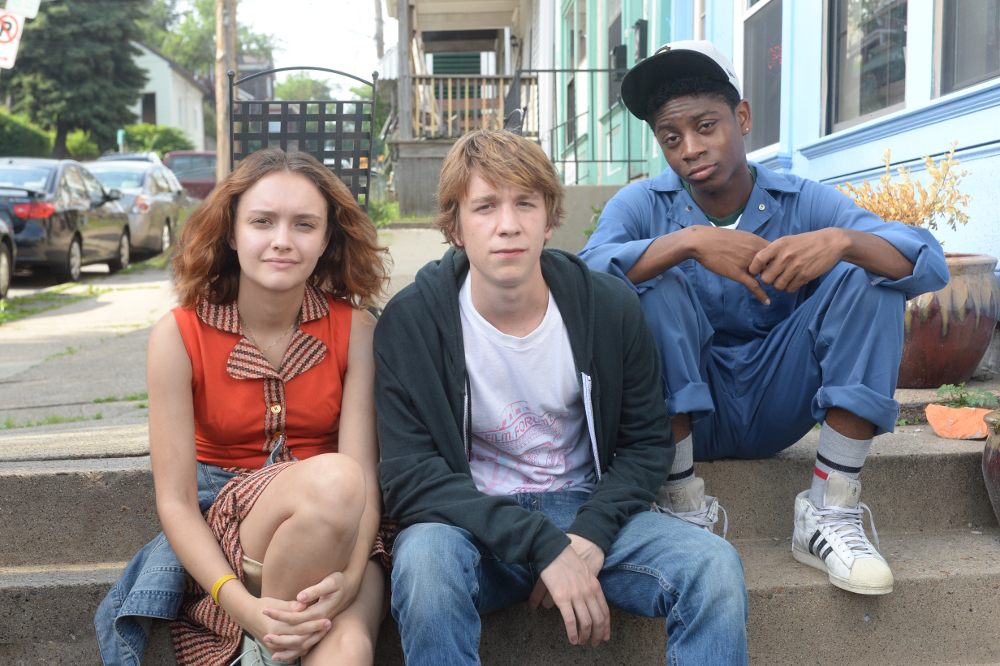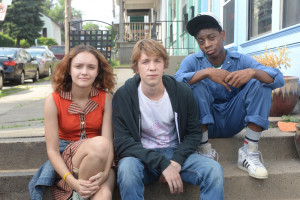
“Me and Earl and the Dying Girl” was this year’s Sundance film festival winner of both the Grand Jury Prize and Audience Choice Award. No wonder: the film is both creative and accessible.
– FILM REVIEW –
– By Cate Marquis –

“Me and Earl and the Dying Girl” was this year’s Sundance film festival winner of both the Grand Jury Prize and Audience Choice Award. The film centers on three high schoolers, Greg, Earl and Rachel, but although Rachel has been diagnosed with leukemia, “Me and Earl and the Dying Girl” is a surprising departure from the romantic “teen with cancer” genre. Avoiding the saccharine or weepy melodrama, director Alfonso Gomez-Rejon instead creates a film that is funny yet moving, one that skillfully mixes comedy with tragedy – and a bunch of film references – to becomes something that feels true.
Based on the novel of the same name and set in Pittsburgh, “Me and Earl and the Dying Girl” is the story of Greg (Thomas Mann) is trying to slip quietly through his senior year of high school that way he has made it through the past three years. Bright but shy, Greg sees high school as a social minefield, which he survives by blending in anonymously. Greg’s strategy is to belong to none of the various cliques, but to stay on friendly if distant terms with all of them. This technique lets him avoid being labeled and to avoid deeper relationships. Greg has names for each of these groups – the Stoners, Jocks, various Jewish girls social groups- all of whom are most defined by gathering at the same lunch table. Greg spends a lot of time with Earl (R.J. Cyler), with whom he makes short film parodies of classic movies, but refers to him as his “co-worker” to avoid calling him what he really is – his best friend.
Greg’s mom (Connie Britton) upsets his social invisibility plan by insisting he to spend time with the daughter of a family friend, Rachel (Olivia Cooke), a girl in his class who has just been diagnosed with cancer. Rachel is a member of “Upper-Middle Class Jewish Senior Girl Sub-Clique 2A” but he and Rachel were friends as kids, although they have not spoken in years. They interact awkwardly at first, with Rachel painfully aware that pity could be behind his visit. When he reveals it is parental pressure instead, they make a deal to hang out to please both moms and also that Greg be brutally honest with her, to help them both get past the cancer thing and just interact.
Greg tries to entertain Rachel by joking around and they find they have a similar sense of ironic humor. Greg describes his technique of remaining invisible by not belonging to any group but being friendly with all groups. Eventually, a friendship grows and Greg introduces her to Earl.
Quirkiness abounds in director Gomez-Rejon’s film but a warmth and heart is at the center of it. The film is filled with quirky humor, despite Rachel’s diagnosis. One part of this film that will appeal to film buffs are the little parody movies Greg and Earl make, delightful bits of which are scattered throughout the film. Another part of the film’s appeal are the honesty of the interactions between Greg, Rachel and Earl, which are both absurdly funny and believable. Greg narrates parts of the film in voice-over, adding pithy observations and a comic spin to events. Through the course of the film, Greg slowly discovers how worthwhile the true bonds of friendship can be.
Part of its foundation rests on the excellent performances. Both Mann as Greg and Cooke as Rachel are wonderful, displaying rare skill in conveying the nuances of their feelings. R.J. Cyler as Earl is also terrific, commanding the screen when he appears, although the part is much smaller. Strong supporting performances also add to the film. Greg’s oddball professor dad is played brilliantly by Nick Offerman Dad mostly hangs out at home, doing research online and whipping up exotic foods that Greg and Earl devour with relish. Earl and Greg first bonded over his dad’s collection of classic films and his cooking. Also good is Rachel’s single mom, played by Molly Shannon, who is drowning herself in wine over her daughter’s cancer. Jon Bernthal plays Mr. McCarthy, a hipster teacher with whom Greg has made a connection, and in whose office he and Earl eat lunch, usually with a side of philosophy.
Gomez-Rejon has a deft touch with this film, taking scenes that could have been nondescript and transforming them, through coaxing marvelous performances from his young cast. The director frames the story with cinematic creativity and an affectionate, often lush visual style, where the Pittsburgh streets almost take on a cozy small town feel, even in the economically-disadvantaged neighborhoods. The film’s poignancy was perhaps sharpened by the director’s recent loss of his own father.
“Me and Earl and the Dying Girl,” which opens here June 26, is an excellent film, delightfully funny yet deeply touching film, with a fresh, creative style. If you have avoided films in the”teen cancer” group, this worth film should be the one exception you make.
© Cate Marquis 2015
